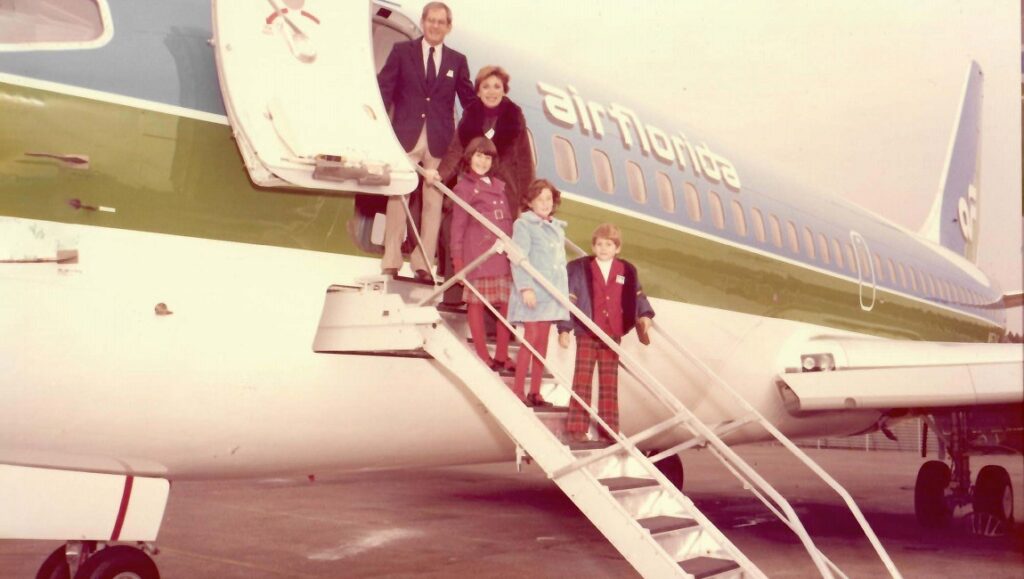Last Flight Home isn’t probing enough and its repetitions can lend a revolving door feel, but there’s a clear and moving heart to the film that builds to a devastating catharsis.
When we first hear the late Eli Timoner reveal his desire to end his life, he is disembodied. The perky rasp of his voice on a phone call plays over a sequence of yellowed family photography, each picture briefly in view before woozily fading into nothing. Weakly, as if already a spirit, he maintains his wry cheer and good humor while frankly pleading for an end to his physical agony. If he is to pass on, some memento must be left behind, a document to provide his legacy shape and form. In a sense, Last Flight Home wastes no time laying out its agenda: to exist as a love letter to a beloved man. What follows is a heartfelt cross between a home movie and video diary, as director Ondi Timoner records her family’s final days with her father, primarily the mandatory 15-day waiting period before Eli can undergo the final procedure. While she rarely risks thoroughly delving into any knotty territory, Timoner’s willingness to wear her heart on her sleeve pumps in enough goodwill to keep this story afloat.
Eli himself makes for a charming central figure. Sweet and spirited, and with a dose of stubbornness, he’s a genuine riot while also capable of quiet moments of rumination. His compassion is contagious, and the film is often at its most tender when he converses with a guest perched by his bedside, his warmth so effusive it’s almost miraculous given his bedridden state. Timoner captures these end times mostly with a vérité-inspired plainness that is somehow both detached in its formality yet immersive in its grander effect. The film works best when its scenes serve as a canvas for projection, when the viewer feels the direct access required to place themselves and their emotional associations into the shoes of the family. It’s a knowingly flat and periodically amateurish technique, but what’s lost in a lack of visual intrigue is balanced by the unobtrusively homespun, homemade essence Timoner earnestly intends on pulling off. She’s after an unaugmented authenticity, one that distills the truth and dignity of an experience without frills or drama, that highlights the laborious, unglamorous demands of familial bonds that might have been excised from a more a stimulating film. Timoner dedicates time to detailing process, with scattered scenes of doctor’s consultations and dosage discussions underscoring the reality of how emotional responses to impending loss must exist alongside the necessary errands and logistics. The accumulation of small smiles and struggles is ultimately what endears us to this man and the devoted family accompanying him.
While Last Flight Home is undoubtedly personal, it seldom seems comfortable wading too deep into personal waters. The on-screen through lines remain uncomplicatedly light, perhaps to counterpoise the undeniable heaviness of the film’s subject matter. Any discourse around physician-assisted suicide steers well clear of controversial perspectives; save for a brief mention or two about physician disagreement on the subject, commitment to the process is promptly accepted. Though a testament to the wide embrace of his kindness, at some point the abundance of single-scene loved ones wishing Eli farewell begins to feel like a revolving door, sacrificing breadth for depth. It also directs attention away from the close family members, who receive relatively greater but still insufficient focus given the suggested depths of their own thoughts on this collective experience. Eli’s unwavering commitment to his choice positions him to function both as the film’s emotional bedrock and a static presence. The combination of his unchanging consistency and the orbiting inconsistency bogs down the pace, as the narrative doesn’t progress so much as it dutifully trudges toward the inevitable. What we learn of Eli’s personal history largely comes in an early stretch of the film, content to rattle off highlights demonstrating his greatness. In Timoner’s proximity to her subject, she can betray an unwillingness to interrogate him, sprinkling in some downer moments but sidestepping any quality exploration almost too gingerly. A stronger film would probe deeper and run tighter (this one being too slight to justify its 100-minute runtime). But despite Last Flight Home‘s shortcomings, it’s difficult not to be fond of the heart at its center. Timoner keeping everything working just enough that, when the end does come, it’s devastatingly cathartic.


Comments are closed.